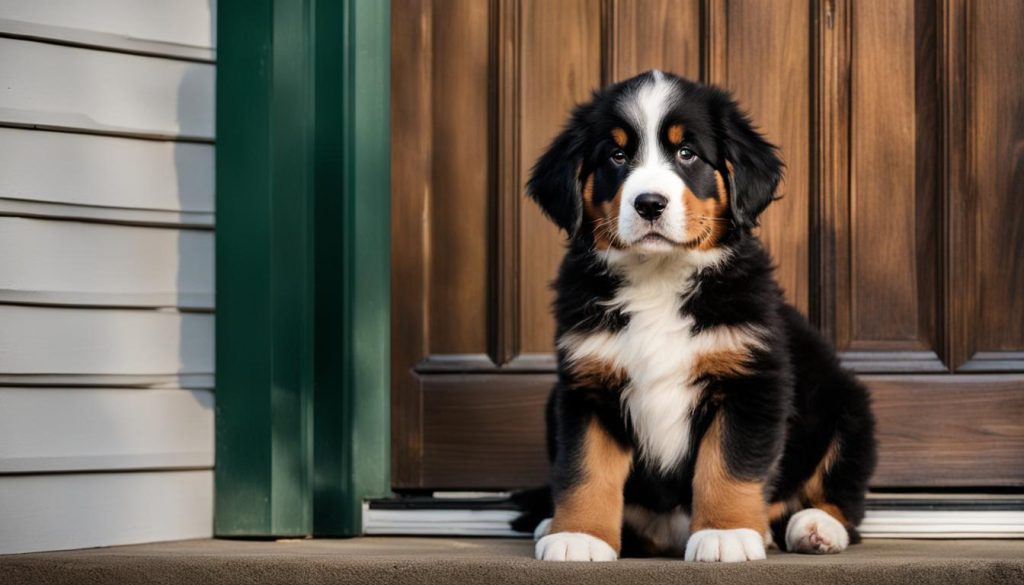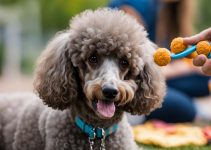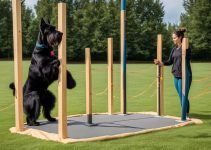As a proud owner of a Bernese Mountain Dog, I understand the importance of proper training to ensure they grow into well-behaved and happy companions. Bernese Mountain Dogs are intelligent and eager to please, making them relatively easy to train. However, their sensitive nature requires a gentle and positive approach to obedience and behavior training.
When it comes to Bernese Mountain Dog training, it’s crucial to consider their specific needs and milestones. Preparation begins even before bringing a puppy home, with research on the breed and enrolling in obedience classes. Socialization and housetraining are key aspects to focus on in the early stages of your dog’s development.
Obedience training is a vital part of nurturing a well-adjusted Bernese Mountain Dog. Working with a professional trainer can provide you with effective strategies to control your dog’s behavior and address any challenges, such as pulling on the leash. Establishing boundaries and using positive reinforcement techniques will help your Bernese Mountain Dog thrive.
Grooming plays a significant role in the care of your Bernese Mountain Dog. Their beautiful double coat requires regular brushing to prevent matting and keep it healthy. Shedding seasons will require extra attention, and bathing should be done sparingly to avoid drying out their skin.
Exercise is essential for the overall well-being of a Bernese Mountain Dog. Regular walks and engaging activities, like swimming, can keep them physically and mentally stimulated. It’s important to start with short walks and gradually increase the distance, taking into consideration their growth plates, which close at around fifteen months.
Reaching sexual maturity is another milestone that Bernese Mountain Dog owners should be aware of. It is recommended to consult with a veterinarian, breeder, and trainer to determine the best age for spaying or neutering, as well as breeding, which is typically recommended at 24 months.
Bernese Mountain Dog training is a journey that requires patience, consistency, and a positive approach. With the right training methods and guidance, your Bernese Mountain Dog can become a well-behaved and delightful companion for years to come.
Bernese Mountain Dog Training
- Research the breed and consider attending obedience classes before bringing a Bernese Mountain Dog puppy home.
- Socialize your Bernese Mountain Dog by introducing them to various people, animals, and environments, once they are properly vaccinated.
- Establish a routine and be patient during the housetraining process.
- Work with a professional trainer to develop effective strategies for obedience training and addressing behavioral challenges.
- Regular grooming, including brushing and bathing, is necessary to maintain the health of your Bernese Mountain Dog’s coat.
Preparing for a Puppy
Before bringing a Bernese Mountain Dog puppy home, it is important to prepare yourself and your living space. Researching the breed and understanding their needs is crucial to ensure a smooth transition for both you and your new furry family member.
Researching the Breed
Take the time to learn about Bernese Mountain Dogs and their unique characteristics. They are known for being large, sturdy, and intelligent dogs that are eager to please. Understanding their temperament, exercise requirements, and grooming needs will help you provide the best care and Bernese Mountain Dog training for your puppy.
Consider Adult Size and Needs
Bernese Mountain Dogs grow to be quite large, reaching an average weight of 80-110 pounds. Ensure that you have enough space in your home to accommodate their size and provide them with a comfortable living environment. Additionally, consider the financial commitment of providing food, grooming, and veterinary care throughout their lifetime.
Book a Wellness Exam
Prior to bringing your Bernese Mountain Dog puppy home, it is important to schedule a wellness exam with a trusted veterinarian. This will ensure that your new puppy is healthy and up to date on vaccinations. The veterinarian can also provide you with guidance on puppy care and address any questions or concerns you may have.
Enroll in Obedience Classes
Early Bernese Mountain Dog training is essential for a well-behaved Bernese Mountain Dog. Consider enrolling in obedience classes before your puppy arrives. These classes will teach you the fundamentals of puppy training and help you establish a strong bond with your new companion. It’s important to start training as early as possible to set your puppy up for success.
Preparing for a Bernese Mountain Dog puppy requires careful consideration and planning. By conducting thorough research, addressing their specific needs, and seeking professional guidance, you can create a welcoming and nurturing environment for your new furry friend.
Socialization and Housetraining
One of the most important milestones in raising a Bernese Mountain Dog puppy is socialization. It is crucial to introduce them to new people, animals, surfaces, and environments. This helps them develop confidence and learn appropriate behavior in different situations.
Once your Bernese Mountain Dog puppy is properly vaccinated, you can start socializing them. Take them on walks to meet friendly people and well-behaved dogs. Gradually introduce them to different environments such as parks, busy streets, and even the vet’s office. Exposing them to various sights, sounds, and smells will help them become adaptable and well-adjusted adult dogs. Remember to always monitor their interactions to ensure a positive and safe experience.
The Importance of Housetraining
In addition to socialization, housetraining is another vital milestone for your Bernese Mountain Dog puppy. Establishing a routine and being patient during this process is key. Consistency is crucial in teaching your puppy where and when to eliminate.
Start by providing your puppy with a designated potty area outside. Take them to this spot after they wake up, after meals, and after playtime. Use a specific command, such as “go potty,” to associate it with the action. When your puppy eliminates in the correct spot, praise and reward them with treats. This positive reinforcement will help them understand what is expected of them.
Accidents might happen during the housetraining process, especially in the beginning. However, it’s important to never punish your puppy for accidents. Instead, clean up the area thoroughly and continue with the consistent routine. Over time, your Bernese Mountain Dog puppy will learn to hold their bladder and only eliminate outside.

Obedience Training
Obedience training is a crucial aspect of Bernese Mountain Dog training. It helps establish boundaries, control the dog’s behavior, and ensure their overall obedience. Investing in professional Bernese Mountain Dog training can be highly beneficial in developing effective training techniques and strategies.
During obedience training, one common challenge with Bernese Mountain Dogs is pulling on the leash. Working with a trainer can help you address this issue and learn how to effectively manage it. They can provide guidance on using proper techniques to control pulling and teach your dog to walk calmly on a leash.
It is important to remember that obedience training is an ongoing process, especially during the adolescent stage of your Bernese Mountain Dog. This stage typically lasts around six months and can be characterized by increased independence and testing boundaries. Revisiting and reinforcing training techniques during this period is essential to maintain consistent obedience.
When it comes to Bernese Mountain Dogs, positive reinforcement training methods work best. These dogs are intelligent and eager to please, making them highly responsive to rewards and praise. Rewarding desired behaviors with treats, verbal praise, or playtime can help motivate and reinforce obedience in your dog.
By focusing on professional Bernese Mountain Dog training and using positive reinforcement techniques, you can effectively train your dog to be well-behaved, responsive, and obedient.
Key Points:
- Investing in professional Bernese Mountain Dog training can be highly beneficial.
- Working with a trainer can help address challenges like pulling on the leash.
- Revisit and reinforce training techniques during the adolescent stage.
- Utilize positive reinforcement methods for optimal results.
Grooming
Proper grooming is essential for maintaining the health and appearance of your Bernese Mountain Dog’s beautiful coat. With their silky, double coat, Bernese Mountain Dogs require regular grooming to keep their fur in top condition and prevent matting. Here are some important grooming tips to keep your Bernese Mountain Dog looking their best.
1. Regular Brushing
To keep your Bernese Mountain Dog’s coat in optimal condition, it’s important to brush them regularly. Weekly brushing will help remove excess fur and prevent matting, especially during shedding seasons. Use a slicker brush or a medium-toothed comb to gently remove any tangles or knots, paying special attention to the areas behind the ears, the mane, and the feathering on the legs and tail.
2. Nail Care
Long nails can cause discomfort and lead to gait issues for your Bernese Mountain Dog. Regularly trim their nails to an appropriate length to keep them comfortable and prevent any potential injuries. If you’re unsure about nail trimming, consult a professional groomer or veterinarian for guidance and assistance.
3. Bathing
Bathing your Bernese Mountain Dog every six to eight weeks is usually sufficient for moderately active dogs. However, excessive bathing can strip their coat of its natural oils and dry out their skin. Use a gentle dog shampoo specifically formulated for their coat type and always rinse thoroughly to remove any residue.
4. Shedding Season
Bernese Mountain Dogs go through shedding seasons where they shed their thick coat. During these times, their fur requires extra attention to remove dead hair and keep it from accumulating in your home. Increase brushing frequency and consider using a de-shedding tool to help manage shedding and minimize loose fur.
Remember: Regular grooming sessions not only help maintain your Bernese Mountain Dog’s coat but also provide an opportunity for you to bond with your furry friend. Make grooming a positive experience by offering treats, praise, and plenty of love!
Exercise and Activity
Regular exercise is essential for Bernese Mountain Dogs to maintain their overall health and prevent behavioral issues. Providing them with appropriate physical and mental stimulation is crucial for their well-being.
One of the best forms of exercise for Bernese Mountain Dogs is walking. It is a low-impact activity that allows them to explore their surroundings, expend energy, and bond with their owners. When starting a walking routine with your Bernese Mountain Dog, it’s important to begin with short walks and gradually increase the distance over time. This helps prevent strain or exhaustion, especially in puppies or dogs that have been less active.
Swimming can also be a beneficial activity for Bernese Mountain Dogs, depending on their preference and the time of year. Swimming provides a full-body workout while being gentle on the joints. It helps improve cardiovascular health, muscle tone, and overall endurance. If you decide to introduce your Bernese Mountain Dog to swimming, always ensure their safety near water, especially if they are inexperienced swimmers.
It’s worth noting that, as large breed dogs, Bernese Mountain Dogs have a slower growth rate, and their growth plates close at around fifteen months of age. Therefore, it is important to avoid engaging in any strenuous exercise or vigorous activities that could potentially impact their growing bones and joints before this time. Always consult with your veterinarian for specific exercise guidelines and recommendations based on your dog’s age and overall health.
Sexual Maturity
Bernese Mountain Dogs reach sexual maturity at different ages. Male Bernese Mountain Dogs can reach sexual maturity as young as 6 months old, while females typically reach it between 9 and 15 months of age. This is an important stage in a dog’s development and it is crucial for owners to be aware of the changes that may occur.
When it comes to spaying or neutering your Bernese Mountain Dog, it is generally recommended to wait until the dog is at least two years old. There are several benefits to waiting, as it allows the dog to fully mature both physically and mentally. In some cases, waiting longer may provide additional health benefits for certain breeds, including Bernese Mountain Dogs.
As for breeding age, it is typically recommended to start considering breeding a Bernese Mountain Dog around 24 months of age. This ensures the dog has reached full maturity and reduces the risk of certain health issues. It is important to consult with a veterinarian, breeder, and trainer to determine the best age for breeding, as individual circumstances may vary.

Conclusion
Bernese Mountain Dog training requires patience, consistency, and positive reinforcement. When it comes to Bernese Mountain Dog training, starting early and establishing clear boundaries and expectations is key for successful training. Socialization, obedience training, and grooming are crucial aspects of training a Bernese Mountain Dog.
Setting realistic expectations is important to ensure a smooth training process. Avoid punishment-based Bernese Mountain Dog training methods as they can have negative effects on the dog’s behavior and well-being. Instead, focus on positive reinforcement and reward-based training techniques to motivate and encourage desired behaviors.
While training your Bernese Mountain Dog, don’t hesitate to seek professional help if needed. An experienced trainer can provide valuable guidance and support throughout the training journey. Remember, every dog is unique, and what works for one may not work for another. Tailor your training approach to your Bernese Mountain Dog’s individual needs and temperament.
With proper Bernese Mountain Dog training and care, a Bernese Mountain Dog can become a well-behaved and happy companion. Follow this Bernese Mountain Dog training guide and implement the best training methods for Bernese Mountain Dogs to ensure a strong bond and a harmonious relationship with your furry friend.
FAQ
How can I prepare for a Bernese Mountain Dog puppy?
Before bringing a Bernese Mountain Dog puppy home, it is important to research the breed and ensure you are prepared to provide for their needs. This includes considering the adult size of the dog and the commitment to provide food, grooming, and veterinary care throughout their lifetime. Booking a wellness exam and enrolling in obedience classes before the puppy arrives can also help in preparing for their training.
What are the key milestones for Bernese Mountain Dog puppies?
Socialization is an important milestone for Bernese Mountain Dog puppies. Once they are properly vaccinated, it is important to introduce them to new people, animals, surfaces, and environments. This helps them develop confidence and learn appropriate behavior in different situations. Housetraining is another key milestone for puppies, and it is important to establish a routine and be patient during the process.
How can I effectively train my Bernese Mountain Dog?
Obedience training is an important part of training a Bernese Mountain Dog. Working with a trainer can help in developing strategies for controlling the dog and dealing with pulling. It is important to establish boundaries and revisit training during the adolescent stage, which can last for six months. Bernese Mountain Dogs are intelligent and eager to please, making them responsive to positive reinforcement training methods.
What grooming needs do Bernese Mountain Dogs have?
Bernese Mountain Dogs have a silky, double coat that requires weekly brushing to remove excess fur and avoid matting. Long nails should be trimmed to avoid pain and gait issues. Bathing should be done every six to eight weeks for moderately active dogs, but excessive bathing can dry out their skin. Owners should be prepared for shedding seasons, where the dog’s coat will require extra grooming to remove dead fur.
How much exercise do Bernese Mountain Dogs need?
Bernese Mountain Dogs require regular exercise to stay healthy and prevent behavioral issues. Walking is a good form of exercise for these dogs, and it is important to start with short walks and gradually increase the distance. Swimming can also be a beneficial activity for Bernese Mountain Dogs, depending on their preference and the time of year. It is important to avoid strenuous exercise before the growth plates close at around fifteen months.
When do Bernese Mountain Dogs reach sexual maturity?
Bernese Mountain Dogs reach sexual maturity at different ages, with males reaching it as young as 6 months and females between 9 and 15 months. It is recommended to wait until the dog is at least two years old before spaying or neutering, and longer if possible. Breeding age for Bernese Mountain Dogs is typically recommended at 24 months. Consultation with a veterinarian, breeder, and trainer can help navigate these milestones.
What are some general tips for training a Bernese Mountain Dog?
Training a Bernese Mountain Dog requires patience, consistency, and positive reinforcement. Starting early and establishing clear boundaries and expectations is important for successful training. Socialization, obedience training, and grooming are crucial aspects of training a Bernese Mountain Dog. It is important to set realistic expectations, avoid punishment-based training methods, and seek professional help if needed. With proper training, a Bernese Mountain Dog can become a well-behaved and happy companion.






